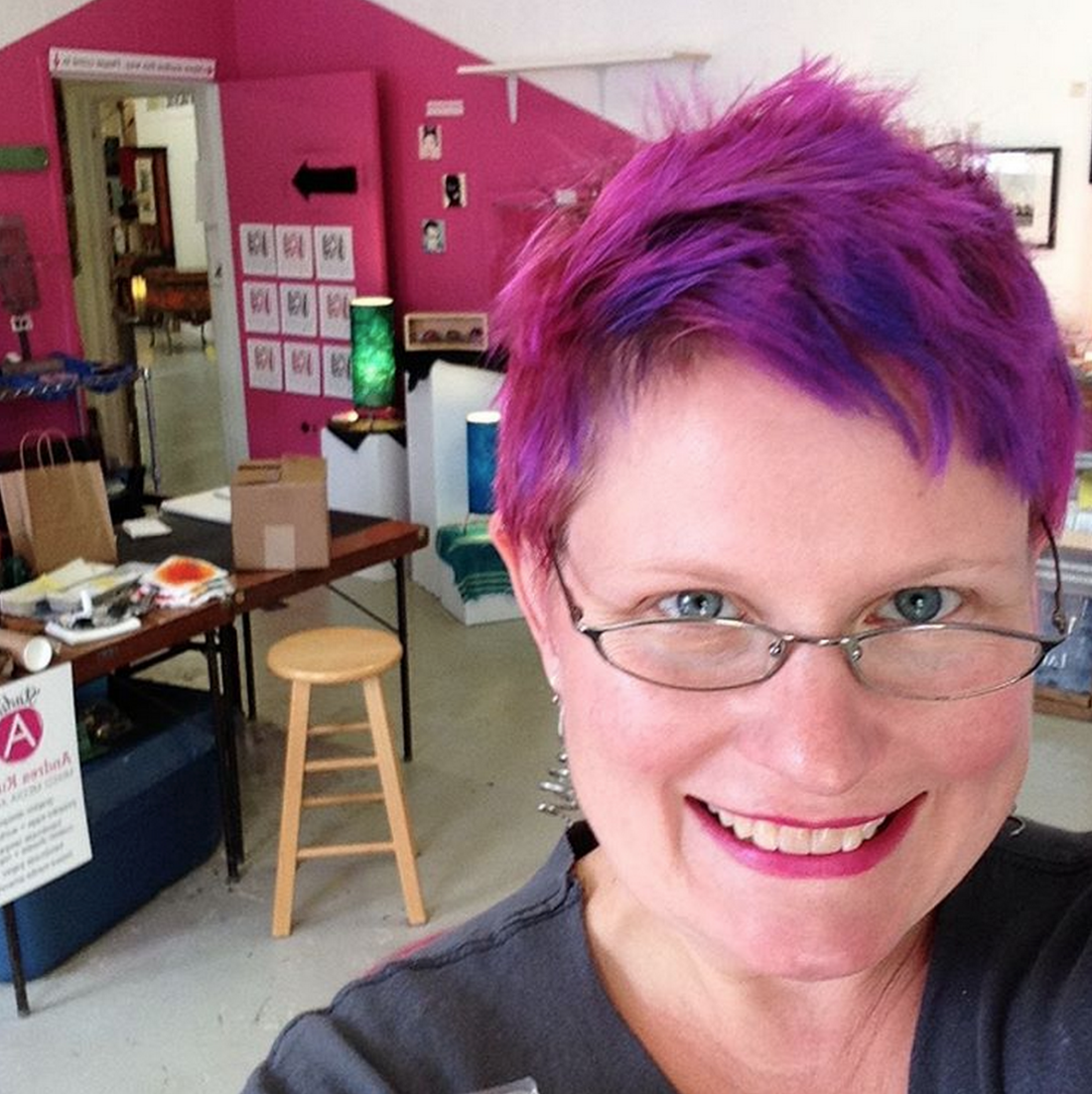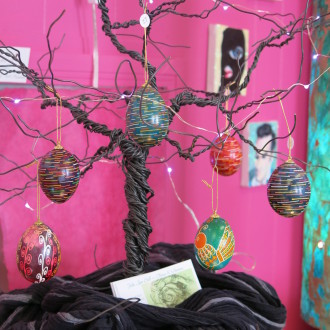Pink is the predominant color at Andrea Kulish’s Studio A in the River Arts District. Pink paint covers the walls, pink dye colors Kulish’s hair and the studio itself is located at the former textile manufacturing and warehouse building on Depot Street, now known as Pink Dog Creative. Perhaps it is mere coincidence that the color symbolizes success and contentment within pysanky (pronounced pih-sahn-KIH), a Ukrainian craft and tradition that involves a wax-resistant method in designing and decorating eggs. Coincidence or not, since her arrival to Asheville in 2013, Kulish has fulfilled a lifelong dream of owning her own studio where, among other things, she teaches the Ukrainian art form.
A first generation Ukrainian-American, Kulish learned pysanky as a young girl. Her late mother, Ariadna, offered lessons in her own art studio based in Hudson, N.Y., where Kulish spent many of her afternoons lost in the art of decorating eggs.
The components for pysanky are fairly basic: An egg, dye, beeswax and a small funnel known as a kistka (which translates to “chicken bone,” although the tool itself — at least these days — is no longer made of such).
The process, however, is complex. Melted beeswax siphons through the kistka, just as ink would from a pen. Unlike ink, though, the beeswax is temporary, functioning as a mask. For these multicolored designs to exist, the egg is dyed one color at a time, beginning with the lighter shades of yellows and oranges before going into the darker shades of blues, purples and browns. With each dyed layer, additional designs are made, using the beeswax as a cover containing the specific color within that given stage. At the end of the cycle, the beeswax is melted off, revealing the multi-layered colors.
Pysanky is an art form that requires much foresight into the overall color scheme and design. It is also a patience game that demands a person’s complete attention. Perhaps for these reasons, many businesses have hired Kulish to lead workshops on the craft as both a team-building exercise and a symbolic gesture of the nuances that go into a successful operation.
Symbolism itself informs many of the designs used in pysanky. Leaves and flowers suggest life, pine needles promise youth and health, deer and horses hold wealth and prosperity, birds symbolize fertility and the fulfillment of wishes.
Birds themselves are also a source of great inspiration for Kulish. Since arriving to Asheville, she has become an avid birdwatcher — their movements and flight are the only things that truly relaxes her.
Appreciation for these winged creatures has led to the incorporation of birds into many of Kulish’s works; works that extend beyond pysanky that include handmade lamps, graphic designs, woodblock prints and note cards. For a woman whose dream involved following her mother’s footsteps, it comes as no surprise that Kulish’s appreciation for birds might have also stemmed from her mother’s own. The very art studio Kulish grew up in was named the Owl’s Nest. And some of her current works incorporate her late mother’s bird designs.
Throughout January, Kulish will teach a four-week course in pysanky at UNC Asheville, as a part of the university’s OLLI program. Her work will also be featured in a Pink Dog Creative group show running from Thursday, Jan. 21 to Sunday, Feb. 21, at The Junction. As Easter nears, Kulish will also be opening up registration for her studio-based classes in pysanky, where she will lead attendees through the Ukrainian craft, just as her mother had those many years ago.
For more information or to register for a workshop, visit Kulish’s website, ashevillestudioa.com.





Before you comment
The comments section is here to provide a platform for civil dialogue on the issues we face together as a local community. Xpress is committed to offering this platform for all voices, but when the tone of the discussion gets nasty or strays off topic, we believe many people choose not to participate. Xpress editors are determined to moderate comments to ensure a constructive interchange is maintained. All comments judged not to be in keeping with the spirit of civil discourse will be removed and repeat violators will be banned. See here for our terms of service. Thank you for being part of this effort to promote respectful discussion.